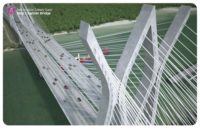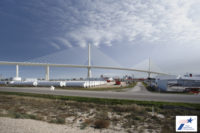More than six months after design work was halted on its signature cable-stayed main spans, construction of the new Harbor Bridge in Corpus Christi, Texas, has pressed ahead, even as uncertainties shroud its ultimate cost and completion schedule.
The Texas Dept. of Transportation paused design work on the nearly $803 million project in November 2019 amid concerns about engineer-of-record FIGG Bridge Engineers’ role in the March 2018 collapse of a pedestrian bridge at Florida International University. TxDOT subsequently asked the Flatiron/Dragados design-build joint venture to find a new design firm for the 1,661-ft-long center spans, a process that the contractor says is still ongoing. A Flatiron/Dragados spokesperson confirms that FIGG remains involved with the 6.4-mile long project’s approach and roadworks packages.
Although construction was underway for nearly two years when the design shake-up occurred, the original 2021 completion date already had been extended by two years, the result, Flatiron/Dragados says, of “weather, local, state, and federal permitting processes/requirements and other unforeseen circumstances.” The contractor provided no estimate regarding how a design review or redesign might affect project cost or schedule once a new engineer is in place, though no major changes are anticipated.
Envisioned as the longest cable-stayed bridge in the U.S., the six-lane structure’s center section will provide more than 200 ft of clearance above the Corpus Christi ship channel, allowing passage for larger commercial and military vessels. The crossing’s existing 60-year old through-arch structure will be demolished upon completion of the new bridge.
Meanwhile, Flatiron/Dragados reports progress on other project elements, including drainage, roadway and overpass construction, and reconstruction of a major new interchange at the nearby junction of Interstate 37, U.S. Route 181 and State Highway 286. More than 60% of the 2,651 total bridge segments have been cast and delivered to the project site. Following completion of the north approach this summer, the gantry crane used for installing the segments will be dismantled and relocated to the south approach.
Flatiron/Dragados has also stepped up its health and safety protocols to protect workers from COVID-19, including PPE gear, employee temperature monitoring and mandatory facial coverings at all times.





Post a comment to this article
Report Abusive Comment